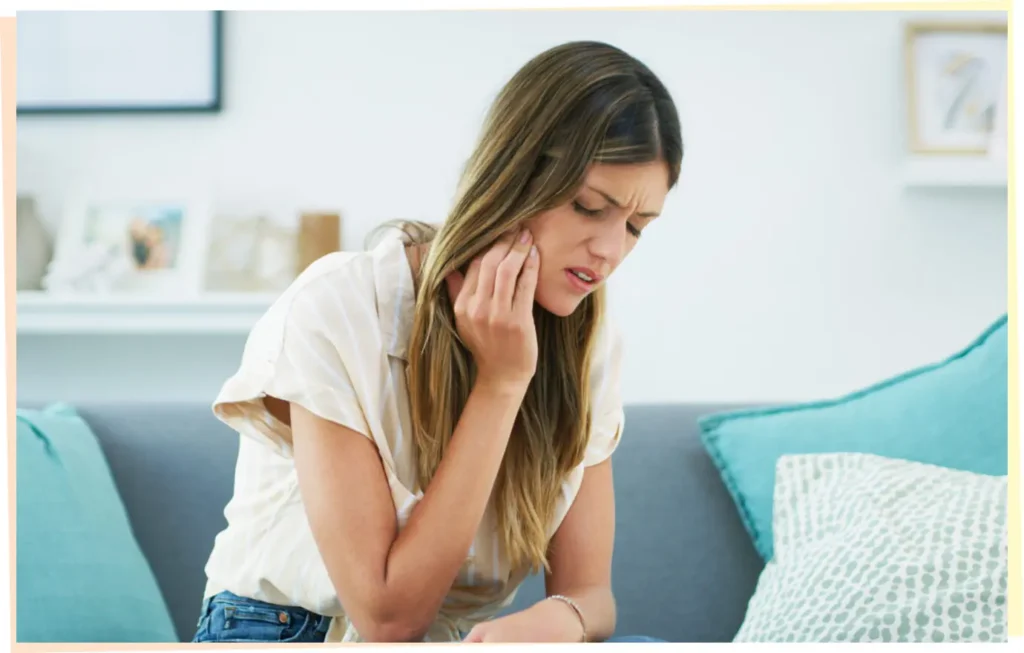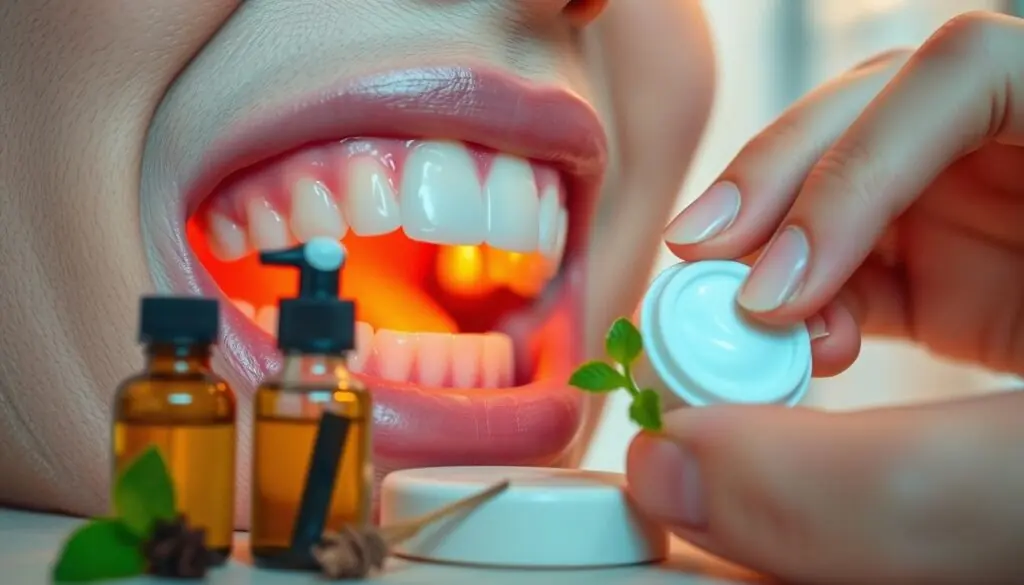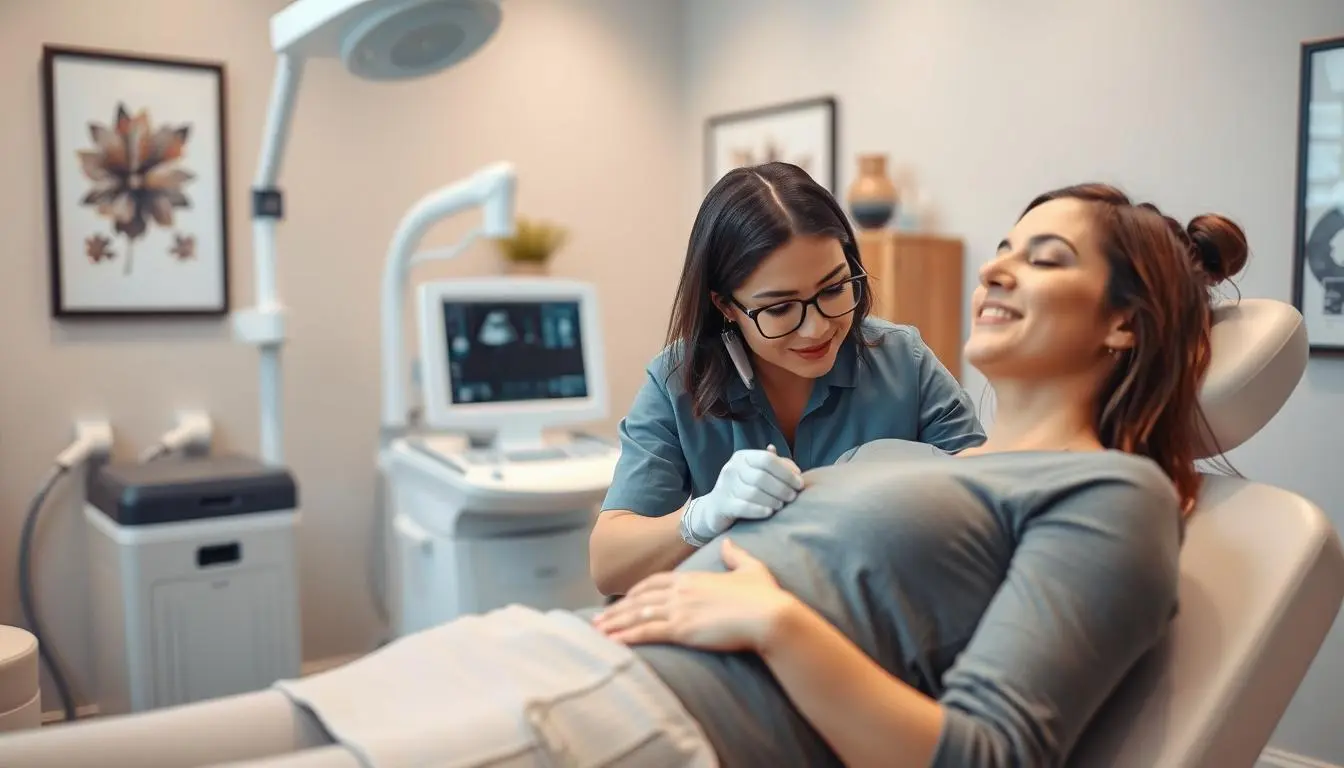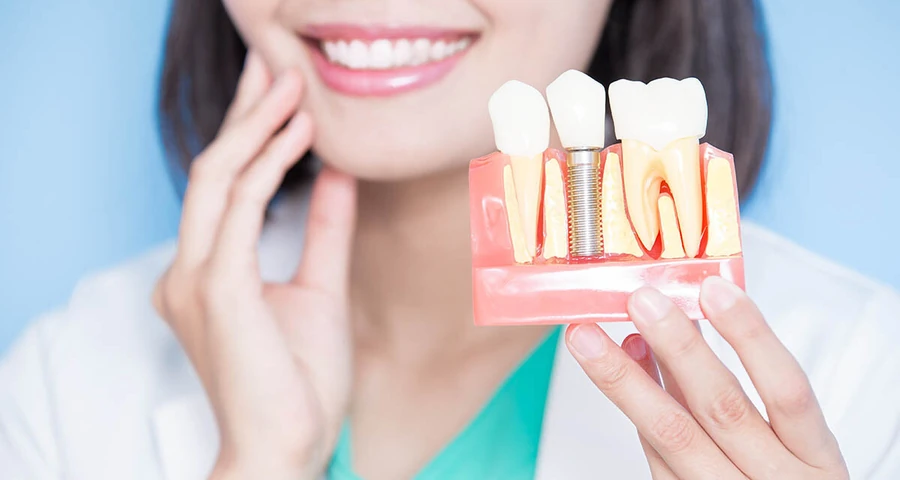One in four adults in the U.S. wake up with tooth pain, a 2023 dental study found. Why do my teeth hurt when I wake up? Morning tooth pain can disrupt your day. But why does it happen? It might be due to grinding your teeth, sinus issues, or your sleep position.
Understanding the cause is key to fixing it. This article explores the science behind morning tooth pain. It also offers solutions to help you feel better.
Key Takeaways
- Up to 25% of adults face morning tooth pain regularly.
- Common causes include bruxism, sinus pressure, and sleep posture.
- Enamel wear or recent dental work can make symptoms worse.
- Simple lifestyle changes may reduce discomfort.
- Professional treatments are available for persistent cases.
Understanding Morning Tooth Pain
Waking up with tooth pain can be confusing. Let’s explore why it happens and what it means for your teeth.

The Science Behind Dental Pain
Your teeth have nerves in their roots. At night, less saliva and pressure changes can bother these nerves. Small problems like cracks or worn enamel can cause pain when you’re resting. This is why some people feel pain in the morning.
Common Symptoms Associated with Morning Tooth Pain
- A dull ache in one or more teeth
- Sensitivity to hot/cold temperatures
- Jaw stiffness or facial soreness
- Sharp pain when biting down
These symptoms often get better as the day goes on. This helps tell them apart from serious problems like cavities.
How Morning Tooth Pain Differs from Other Dental Pain
| Issue | Morning Tooth Discomfort | Severe Dental Problems |
|---|---|---|
| Pain Duration | Worsens upon waking, lessens later | Pain remains constant or intensifies |
| Trigger Factors | Sleep position, clenching/grinding | Infection, decay, or gum disease |
| Response to Treatments | Relieves with hydration or OTC pain relief | Requires professional dental intervention |
If your pain only happens in the morning, it might be from temporary irritation. But it’s always best to check with a dentist to be sure.
Why Do My Teeth Hurt When I Wake Up? Common Causes
Morning tooth pain can come from many sources. Here are the main reasons for toothache in the morning. These include dental problems and lifestyle habits. Let’s look at the most common causes:
- Teeth grinding (bruxism): Clenching teeth at night wears away enamel and strains jaw joints, causing morning discomfort.
- TMJ disorders: Misaligned jaw joints create stiffness and pain when waking.
- Sinus pressure: Congestion near upper teeth can mimic toothache due to sinus inflammation.
- Sleep position: Lying on one side may unevenly press on teeth or jaw muscles.
- Nighttime dehydration: Dry mouth reduces saliva, increasing sensitivity and decay risks.
- Recent dental work: New braces or fillings may feel tender after overnight pressure.
- Enamel erosion: Acid exposure weakens enamel, heightening morning sensitivity.
- Cavities or decay: Bacteria activity overnight can worsen existing cavities.
- Gum disease: Inflammation from gum infections often intensifies while sleeping.
- Teeth shifting: Misalignment causes uneven pressure, leading to targeted pain.
Not all causes apply to every case. Tracking symptoms alongside these triggers helps narrow down the root issue. Later sections explore each cause in detail to guide you toward relief.
Also Read: Worst Day of Pain After Wisdom Tooth Extraction: What to Expect
Nighttime Teeth Grinding and Clenching
Bruxism, or teeth grinding, happens when we sleep without realizing it. Many people first feel it when they wake up with toothache upon awakening or early morning tooth pain. This habit can harm your teeth and jaw over time.
Signs You Might Be Grinding Your Teeth
- Flattened or chipped tooth surfaces
- Increased tooth sensitivity
- Jaw soreness upon waking
- Earaches or temple headaches
- Scratches or bite marks inside cheeks
The Connection Between Stress and Bruxism
Stress makes our jaw muscles tight while we sleep. Studies show 70% of those who grind at night also feel anxious during the day. Things like caffeine and alcohol can make it worse by messing with our sleep.
How Grinding Affects Dental Health Over Time
| Short-term effects | Temporary jaw stiffness |
|---|---|
| Long-term consequences | Severe enamel erosion, cracked teeth, TMJ disorders |
| Severe cases | Permanent bite misalignment requiring orthodontic correction |
If you wake up with early morning tooth pain often, see a dentist. They can make a custom nightguard to help. They can also help you manage stress or treat sleep apnea.
Sinus Pressure and Morning Tooth Discomfort
If you wake up with morning teeth sensitivity or tooth sensitivity upon waking, it might be your sinuses. The roots of your upper teeth are near the maxillary sinuses. These are air-filled spaces in your cheekbones.
When sinuses swell, it puts pressure on these roots. This can cause tooth pain.
Sleeping flat lets mucus and fluid build up in your sinuses. This makes the pressure worse by morning. It can make your upper teeth hurt, often on both sides of your face.
This pain is different from tooth decay or gum problems. It gets better when you stand up but comes back when you tilt your head.
- Pain in multiple upper teeth without visible decay
- Facial tenderness near cheekbones or forehead
- Congestion or postnasal drip
- Pain worsening when bending forward
Seasonal allergies or colds can make your sinuses swell. This can make your teeth hurt more in the morning.
If decongestants help, it’s probably sinus pressure.
It’s easy to mix up dental problems with sinus pain. Sinus pain doesn’t get better with sweet or hot/cold foods.
If the pain keeps coming back, see an ENT specialist. They can check for infections. Don’t ignore morning teeth sensitivity. Getting the right diagnosis can save you from unnecessary dental work.
Sleep Position and Its Impact on Dental Pain
Wondering why do my bottom teeth hurt when I wake up? It might be because of how you sleep. Side sleeping puts pressure on your jaw and teeth. This can make your teeth and jaw joints sore.
How Side Sleeping Affects Tooth Pressure
Side sleeping changes how your jaw aligns. This can wear down your tooth enamel or irritate nerves. People with sensitive teeth might feel sharp pain in the morning.
Blood Flow Changes During Sleep
Lying flat changes blood flow, swelling tissues around your teeth. Morning pain can be worse because blood flow to your face increases at night. This can make sensitivity or inflammation worse.
Adjust Your Sleep Position for Relief
- Sleep on your back to reduce jaw pressure.
- Use a pillow that keeps your head level with your spine.
- Try gradual shifts—start by lying on your back for 30 minutes nightly.
Making small changes to your sleep can help with morning tooth pain. If pain doesn’t go away, see a dentist.
Braces-Related Morning Pain: Why It Happens
Waking up with aching teeth when you wear braces isn’t random. Braces apply constant pressure to move teeth. This pressure can feel worse in the morning because swelling builds overnight.
You might wonder, “Why do my teeth hurt with braces randomly?” It’s often due to uneven shifts in tooth position as you sleep.
Inflammation peaks during sleep, causing tenderness that feels worse upon waking. The body’s natural pain relief, like endorphins, is lower in the morning. This makes discomfort feel more intense.
If your braces hurt so bad you want to cry, it could signal a recent adjustment. Orthodontic adjustments intentionally create pressure, but this pain typically fades within a few days.
Sometimes only one tooth hurts with braces. This happens when specific teeth are being moved aggressively. Your orthodontist targets these areas, causing localized soreness. Even minor shifts can trigger sharp discomfort in just a few teeth.
Nighttime grinding worsens pain by adding force to already pressured teeth. Even without grinding, lying flat can alter blood flow, making pain feel sharper. Morning soreness usually lessens as teeth adapt.
Over-the-counter pain relievers and saltwater rinses ease inflammation. Contact your orthodontist if pain lasts beyond a week or interferes with daily life.
Tooth Sensitivity Upon Waking: Causes and Triggers
Morning tooth sensitivity often feels like a sharp reaction to cold or sweet items. It’s different from dull aches caused by deeper issues. Knowing what causes it can help manage discomfort.
Enamel Erosion and Morning Sensitivity
Enamel wears down overnight due to acid exposure from acidic foods, nighttime reflux, or grinding. Saliva flow slows during sleep, leaving teeth less protected. Over time, this weakens enamel, exposing nerves and causing sensitivity.
“Enamel erosion isn’t visible but leaves teeth vulnerable to temperature changes,” says dental experts.
Temperature Sensitivity After Sleep
Teeth may react more to cold in the morning due to overnight enamel stress. Can braces cause tooth sensitivity to cold? Yes—braces apply pressure that temporarily alters enamel structure, making teeth more reactive to cold drinks or foods first thing in the morning.
Foods and Drinks That Worsen Morning Sensitivity
Avoid these before bed to reduce morning sensitivity:
- Citrus fruits (oranges, lemons) – high acid content
- Carbonated sodas – acids and sugars
- Coffee/tea – tannins and acidity
- Candy and sugary snacks – feed bacteria that erode enamel
- Alcohol – dries mouth, reducing saliva’s protective role
Wait at least 30 minutes after eating acidic or sugary items before brushing to prevent further enamel wear.
Why Your Bottom or Front Teeth Might Hurt Specificall
Tooth pain isn’t the same for everyone. If why do my two front teeth hurt when i wake up worries you, knowing about tooth anatomy and pain spots can help. The shape of your mouth affects where you feel pain.
- Front teeth (incisors) have thinner enamel, making them more sensitive to pressure or temperature changes.
- Lower teeth bear more force during jaw clenching due to their position in the mouth’s bite alignment.
- Nerve pathways vary: front teeth connect to nerves closer to sinus areas, linking pain to sinus issues.
Common Causes Based on Tooth Location
| Tooth Area | Potential Causes |
|---|---|
| Bottom Teeth | Jaw clenching during sleep, wisdom teeth erupting, or uneven pressure from side sleeping |
| Front Teeth | Sinus infections spreading to upper incisors, braces/retainer adjustments, or pressure from sleeping face-down |
Focus on Front Teeth Pain
If why do my two front teeth hurt when i wake up is your question, consider these factors:
- Sinus Involvement: Upper front teeth share space with sinus cavities, so congestion can trigger pain.
- Orthodontic Movement: Braces or retainers shift front teeth first, causing morning soreness.
- Mouth Breathing: Sleeping with your mouth open dries out front teeth, exposing them to temperature sensitivity.
Tracking which teeth hurt helps dentists identify root causes. Note if pain is sharp (possible cracks) or dull (infection or grinding) to guide treatment.
Effective Treatments for Morning Tooth Pain
Quick relief starts with over-the-counter options. Ibuprofen or acetaminophen work by reducing inflammation or blocking pain signals. Taking them before bed may ease morning discomfort.
For immediate numbing, topical treatments like clove oil or benzocaine gels create a barrier over sensitive areas. A saltwater rinse—1/2 teaspoon of salt in warm water—can reduce swelling and clean gums.
For those dealing with braces, here’s how to stop braces pain immediately: Apply orthodontic wax to smooth rough brackets, use a soft-bristle toothbrush to clean around wires, or suck on ice chips to numb sore spots.
Cold compresses applied to swollen cheeks also help. Avoid hard or sticky foods—opt for yogurt or mashed potatoes to prevent irritation.
- Physical relief: Gently massage jaw muscles near your earlobe to release tension. Stretch lips wide then relax to ease facial tightness.
- Long-term fixes: Custom night guards prevent grinding. Adjusting your pillow height can reduce jaw strain. Drink water before bed to stay hydrated and rinse away nighttime acid buildup.
“Temporary fixes address symptoms, but consistent dental checkups find root causes like cavities or misalignment,” says Dr. Emily Carter, a certified orthodontist in Texas.
Pair these steps with nightly flossing around braces and using a fluoride gel to strengthen enamel. Always consult your dentist if pain persists—it could signal deeper issues needing professional care.
Preventing Teeth from Hurting When You Wake Up
Stopping morning tooth pain starts with daily habits that protect your teeth overnight. Simple changes to your routine can reduce sensitivity and grinding risks. Let’s explore proven steps to keep your smile healthy all night long.
“Consistent prevention strategies are the key to stopping morning tooth pain at its source.” — Dr. Emily Carter, Dental Health Specialist
Nightguards and Protective Devices
Custom dental nightguards from your dentist offer the best fit. OTC options or sports mouthguards work for mild cases. Clean devices daily with mild soap and let them dry.
Retainers for orthodontic patients should be worn as directed to avoid shifting teeth that cause pressure. Avoid hard foods to prevent damage.
Evening Routines That Help Prevent Morning Pain
- Brush twice daily with fluoride toothpaste before bed.
- Floss nightly to remove trapped food particles.
- Use a warm compress to relax jaw muscles.
- Try 10 minutes of meditation to reduce stress-induced grinding.
- Keep a humidifier running to prevent dry mouth.
Dietary Changes That Can Make a Difference
Limit acidic foods (citrus, tomatoes) and sugary snacks after dinner. Avoid alcohol before bed to reduce dry mouth. Opt for yogurt or cheese to strengthen enamel.
Drink water last thing at night to stay hydrated.
Small adjustments like these create lasting protection. Prioritize consistency to build habits that stop tooth pain before it starts.
When to See a Dentist About Morning Tooth Pain
If you wake up with tooth pain that doesn’t go away or gets worse, it’s time to see a dentist. Here are the signs that mean you need to get help right away:
- Pain lasting all day, not just upon waking
- Visible cracks, chips, or loose fillings
- Swelling near the jaw or gums
- Fever or overall body aches
- Pain so intense it wakes you at night
- Difficulty eating or speaking
- Symptoms getting worse over days
| Diagnostic Step | What It Reveals |
|---|---|
| Physical exam | Checks for tooth damage, gum inflammation, or jaw issues |
| X-rays | Identifies hidden cavities, fractures, or bone loss |
| Sleep habit review | Links pain to grinding, posture, or medical conditions |
A dentist will figure out what’s causing your morning toothache. They might recommend a nightguard for grinding, adjust your braces, or fill a cavity. Don’t ignore pain that doesn’t go away—it could be a sign of something serious.
Be prepared to tell your dentist about your pain, sleep habits, and any recent dental changes. Getting help early can prevent bigger problems later.
Must Read: Histamine Dump at Night Symptoms – Causes & Solutions!
Conclusion
Morning tooth pain often comes from grinding teeth at night, how you sleep, sinus problems, or wearing braces. Fixing these issues early can help ease pain and avoid serious damage. Simple steps like using a nightguard, changing your sleep position, or managing stress can help.
Home care is crucial. Brushing gently with sensitivity toothpaste, avoiding hard foods before bed, and staying hydrated can help. If pain persists, seeing a dentist for custom mouthguards or exams is important to find and fix problems like cavities or alignment issues.
Ignoring tooth pain can lead to bigger problems like enamel erosion or jaw strain. Regular dental visits can catch issues early. Small changes, like choosing the right pillow or rinsing with warm salt water, can make a big difference.
Understanding the cause of your tooth pain is the first step. Whether it’s changing habits or getting treatment, acting now can stop pain from becoming a constant issue. Take care of your teeth: try a prevention tip today or book a dental checkup to tackle any lingering discomfort. A pain-free morning is possible with the right choices and professional care.
Also Read: How Long Does a Temporary Crown Last? Key Facts
Frequently Asked Questions
1. Why do my teeth hurt when I wake up?
Teeth pain in the morning can come from many sources. This includes grinding your teeth, sensitivity, or sinus pressure. Finding out why is key to feeling better.
2. What are the common causes of morning toothache?
Morning toothache can be caused by several things. These include grinding your teeth, TMJ issues, sinus problems, dry mouth, recent dental work, and worn enamel. Knowing these causes helps in managing the pain.
3. How can sleep position lead to morning teeth discomfort?
Sleeping on one side can put uneven pressure on your jaw and teeth. This can cause discomfort, more so if you already have dental issues or jaw tension.
4. Can braces cause tooth sensitivity to cold?
Yes, braces can make your teeth more sensitive, mainly after adjustments. The pressure from braces can temporarily affect the enamel, making teeth more reactive to temperature changes.
5. Why do my two front teeth hurt when I wake up?
Pain in the front teeth can be due to several reasons. This includes bite pressure, grinding, or sensitivity from temperature changes. Stress and jaw tension can also affect their alignment, causing discomfort.
6. What signs indicate that I might be grinding my teeth at night?
Signs of bruxism include worn enamel, increased sensitivity, sore jaw muscles, headaches, and noticeable wear on teeth. Many people don’t realize they grind their teeth until they wake up with pain.
7. When should I see a dentist about my morning tooth pain?
See a dentist if your morning pain lasts all day, is with swelling or fever, or if you see damage to your teeth. Ignoring these signs can make conditions worse.
8. How can I stop braces pain immediately?
For quick relief from braces pain, use orthodontic wax on sharp edges, apply a cold compress, or take pain relievers as directed.
9. Why do my bottom teeth hurt when I wake up?
Pain in bottom teeth upon waking can be from uneven pressure, bruxism, or tooth movement from orthodontics. It’s important to watch for patterns that might show deeper issues.
10. What evening routines can help prevent morning tooth pain?
A good evening routine includes proper oral hygiene, jaw relaxation techniques, and avoiding acidic or sugary foods before bed. This can help prevent morning tooth pain.



